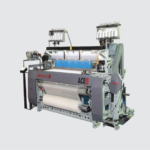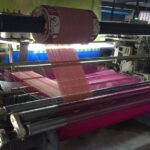Complete Guide To Winding Machines: What They Are and Types
Complete Guide To Winding Machines: What They Are and Types

Winding machines have a vital role to play in the context of textile mills and manufactures and it is primarily used for winding the yarns that are required to be processed further. At Weavetech, we are the leading textile machinery manufacturer in Gujarat, and we take utmost care to explain the winding technology and its role in determining the quality and efficiency of textile manufacturing. The information in this guide will include a categorization of winding machines as well as the various facets of the machines and their importance in the textile industry.
What Are Winding Machines?
Winding machines are one of the kinds of special machines used in yarns, threads, or any form of material to put into any type of spool and bobbin packages. Yarn finishing is vital in this regard, as it entails the gathering and arrangements of yarn, which is useful in the subsequent phases of clothes production including weaving, knitting, or sewing. The main use of winding machines is to reorganize yarn from hanks or skeins in order to better prepare it for the next step of the processing stage.
Importance of Winding Machines
- Improved Yarn Quality: This machine assists in detecting any flaws in the yarn like slubs, thick and thin places, amongst others before the yarn is checked out hence making the yarn to be of high quality.
- Enhanced Efficiency: These machines help to package the yarns into neat structures to enable ease of use by other machines during the later processes in the manufacturing process.
- Cost-Effective: Minimizing the wastage of resources through good winding helps in promoting efficiency in other processes hence cutting down cost.
- Customization: The style used in the current models facilitating the winding machines have programmable facilities that can be adapted depending on the type of fabric material being produced.
Types of Winding Machines
The winding machines can also be categorized in relation to what they do and or the type of package of yarn that is produced. Here are the main types of winding machines:Here are the main types of winding machines:
Cone Winding Machines:
- Description: These machines twist the yarns and place them in cones and these are preferred in the textile industry due to the convenience of handling the cones or the uniform shape they parade.
- Applications: Extremely useful in knitting, weaving and other processes that have to do with yarns.
Bobbin Winding Machines:
- Description: These machines do winding of yarn onto bobbins which finds uses in sewing machines and other means of textile machineries.
- Applications: It is used in the sewing thread production processes and in any textile manufacturing processes that take part in using bobbins.
Hank to Cone Winding Machines:Hank to Cone Winding Machines:
- Description: These machines help to wind the yarn from hanks to cones – this makes the yarn easier to manage and process.
- Applications: They are normally implemented in dyeing establishments where yarn is usually supplied in hank form.
Precision Winding Machines:
- Description: The use of precision winding machines is to have consistent packages of yarns with highest level of accuracy. They maintain the degree of tension and the rate of winding movement very carefully.
- Applications: Applied in various industries and production lines that require meeting stringent technical standards, including technical textiles and fine textiles.
Random Winding Machines:
- Description: These machines fail to wind product with specific pattern instead they produce packages with random density n tension.
- Applications: Recommended where tension control is not as important such as in the handling of very light gauges.
Automatic Winding Machines:
- Description: These sophisticated equipment possess more options like auto- doffing of the yarns, auto-splicing of the yarns and even auto-detection of faults in the products.
- Applications: Most suitable for production in large numbers as they mostly involve the use of technological processes.
Drum Winding Machines:
- Description: Drum winding machines employ a cylindrical drum onto which the yarns are placed; the drum’s rotating action helps in evenly placing the yarn on the package.
- Applications: Mainly used in winding small but equal counts of yarn packages for weft and velter in the weaving and knitting industry.
Traverse Winding Machines:
- Description: These machines employ a traversing system for the uniform conveying of the yarn across the package.
- Applications: Ideal for their ability to create cross-wound packages that are stable and less likely to experience slippage.
Innovations in Winding Technology
Weavetech has not only aimed at being an innovative company but works hard to develop better winding machines that suit modern day requirements in the textile sector. Our machines are equipped with advanced features such as: Our machines are equipped with advanced features such as:
- Programmable Controls: This provided a means by which winding parameters could be easily manipulated and controlled within acceptable ranges.
- Yarn Defect Sensors: Disposing of likely defect vections of yarn, throughway of automatic detection of defective sections of the yarn.
- Energy Efficiency: Built with dual objectives of saving energy and therefore reducing cost.
- User-Friendly Interfaces: Reducing the complexity of the machine’s usage and the time required for maintenance.
Winding machines play an important role in the textile industry where these machines are utilized effectively to provide a high-quality winding of yarns before moving on to the next stage. At Weavetech, we have many different types of winding machines to support all sorts of textiles needs. Weavetech is the best textile machinery manufacturer in Gujarat. This paper narrows down the focus and presents a broad outline of the various types of winding machines and their use to assist textile manufacturers to make the right decision regarding acquisition of winding machines to improve their production line.
If you want to know more about our present high technology winding machines and its application for textile industries please visit Weavetech and discover your textile machinery needs.






